Pumpkins are a popular fall treat for humans, but if you’re a rabbit owner, you might be wondering if it’s safe to share some pumpkin with your furry friend. While rabbits are herbivores that thrive on a diet of hay, leafy greens, and vegetables, not all foods are suitable for their sensitive digestive systems. Let’s dive into the vet-approved facts about whether rabbits can eat pumpkins, how much they can safely consume, and the benefits and risks associated with this seasonal fruit.
Can Rabbits Eat Pumpkins?
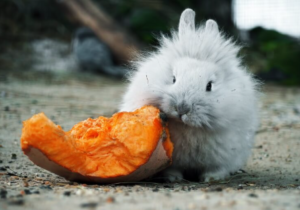
Yes, rabbits can eat pumpkin, but only in moderation. Pumpkin is a safe treat for rabbits when given in small amounts and in its natural, raw form. However, it should never replace their primary diet of hay, as pumpkin is high in sugar and can cause digestive issues if overfed.
What Parts of the Pumpkin Can Rabbits Eat?
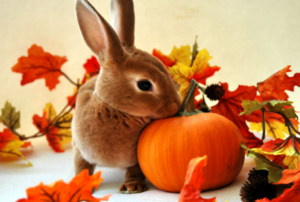
Rabbits can eat several parts of the pumpkin, but some parts are safer and more nutritious than others:
| Pumpkin Part | Safe for Rabbits? | Notes |
| Pumpkin Flesh | ✅ Yes | Feed in small quantities due to sugar content. |
| Pumpkin Skin | ✅ Yes | Safe to eat, but should be washed thoroughly. |
| Pumpkin Seeds | ❌ No | Seeds are a choking hazard and difficult to digest. |
| Pumpkin Leaves | ✅ Yes | Safe and nutritious in small amounts. |
| Pumpkin Stems | ❌ No | Too tough and fibrous for rabbits to eat. |
Nutritional Value of Pumpkin for Rabbits
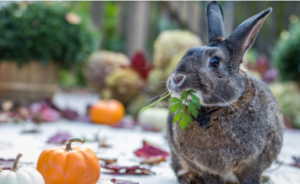
Pumpkin is rich in several vitamins and minerals that can benefit your rabbit when fed in moderation. Here are some key nutrients found in pumpkin:
- Vitamin A: Supports eye health and the immune system.
- Vitamin C: Acts as an antioxidant and boosts overall health.
- Fiber: Helps with digestion and promotes healthy gut function.
- Potassium: Supports muscle function and hydration.
However, it’s important to note that pumpkin is also high in natural sugars, which can cause digestive problems if fed in excess.
Health Benefits of Pumpkin for Rabbits
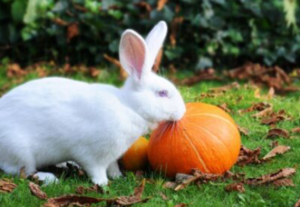
When given as an occasional treat, pumpkin can provide some health benefits for rabbits:
1. Digestive Health
- Pumpkin contains a good amount of dietary fiber, which can help support your rabbit’s digestive system. Fiber is essential for maintaining a healthy gut and preventing issues like diarrhea and bloating.
2. Hydration
- Pumpkin has a high water content, which can help keep your rabbit hydrated, especially during warmer months.
3. Immune System Support
- The vitamins and antioxidants in pumpkin can help boost your rabbit’s immune system, keeping them healthier and more resistant to illness.
Risks of Feeding Pumpkin to Rabbits
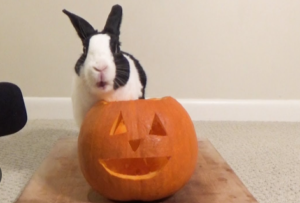
While pumpkin has some benefits, there are also risks associated with feeding it to rabbits:
1. High Sugar Content
- Pumpkin is naturally high in sugar, which can disrupt your rabbit’s digestive system. Too much sugar can lead to obesity, diarrhea, and other gastrointestinal problems.
2. Risk of Choking
- Pumpkin seeds are a choking hazard for rabbits and should be avoided. The seeds are also difficult for rabbits to digest.
3. Dental Issues
- Feeding too many sugary treats can contribute to dental problems in rabbits. Their teeth grow continuously, and sugary foods can accelerate tooth decay.
How to Safely Feed Pumpkin to Your Rabbit
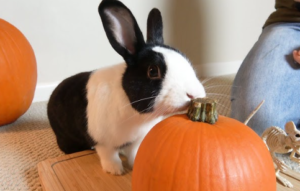
If you decide to give your rabbit a small amount of pumpkin, follow these steps to ensure their safety:
Step 1: Choose a Fresh, Raw Pumpkin
- Make sure the pumpkin is fresh and free from mold or rot. Avoid canned pumpkin or pumpkin pie filling, as these often contain added sugars and preservatives.
Step 2: Wash the Pumpkin Thoroughly
- Before feeding, wash the pumpkin to remove any dirt, pesticides, or contaminants.
Step 3: Cut the Pumpkin into Small Pieces
- Cut the pumpkin into small, bite-sized pieces to make it easier for your rabbit to eat and digest.
Step 4: Feed in Moderation
- Start with a small piece of pumpkin to see how your rabbit reacts. Monitor them for any signs of digestive distress, such as diarrhea or bloating.
How Much Pumpkin Can a Rabbit Eat?
Pumpkin should only be given as an occasional treat. A safe serving size is about 1 to 2 tablespoons of pumpkin flesh for an adult rabbit. This can be given once or twice a week at most.
Avoid feeding pumpkin to baby rabbits, as their digestive systems are more sensitive and can be easily upset by new foods.
Frequently Asked Questions (FAQ)
1. Can Rabbits Eat Pumpkin Seeds?
No, rabbits should not eat pumpkin seeds. The seeds pose a choking hazard and are difficult for rabbits to digest.
2. Can Rabbits Eat Cooked Pumpkin?
No, cooked pumpkin is not recommended for rabbits. Stick to raw pumpkin, as cooking can change the texture and nutritional value of the fruit.
3. Can Rabbits Eat Pumpkin Skin?
Yes, rabbits can eat pumpkin skin, but it should be washed thoroughly to remove any pesticides or contaminants.
4. Is Canned Pumpkin Safe for Rabbits?
No, canned pumpkin is not safe for rabbits. It often contains added sugars, preservatives, and other ingredients that can harm your rabbit’s health.
5. Can Rabbits Eat Pumpkin Leaves?
Yes, pumpkin leaves are safe for rabbits to eat in small amounts. They are a good source of fiber and nutrients.
6. What Should I Do if My Rabbit Eats Too Much Pumpkin?
If your rabbit eats too much pumpkin, monitor them for signs of digestive distress, such as diarrhea or bloating. Provide plenty of hay and fresh water to help regulate their digestion. If symptoms persist, contact a veterinarian.
Alternatives to Pumpkin for Rabbits
If you’re looking for other healthy treats to give your rabbit, consider these options:
- Carrots (in moderation)
- Bell Peppers
- Zucchini
- Cucumber
- Romaine Lettuce
- Parsley
- Cilantro
Always introduce new foods slowly and in small quantities to ensure your rabbit doesn’t have an adverse reaction.
Conclusion
Pumpkin can be a healthy and enjoyable treat for your rabbit when given in moderation. It provides essential vitamins and fiber that can benefit their overall health. However, due to its high sugar content, it should only be offered occasionally and in small amounts. Always prioritize your rabbit’s primary diet of hay, fresh vegetables, and clean water.
By following these guidelines and vet-approved safety tips, you can safely share a seasonal pumpkin treat with your furry friend without compromising their health. As always, if you have any concerns about your rabbit’s diet, consult with a veterinarian for personalized advice.
